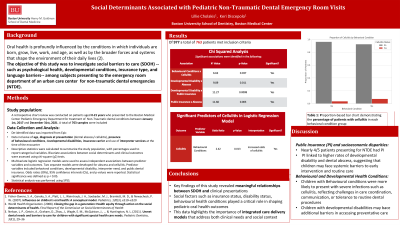Other
375 - Social Determinants Associated with Pediatric Non-Traumatic Dental Emergency Department Visits

- LC
Lillie Cholakis, DDS
Resident
Boston University, Boston, MA
Boston University
Boston, Massachusetts, United States - KD
Keri Discepolo, DDS, MPH
Program Director, Pediatric Dentistry
Boston University
Boston, Massachusetts, United States
Presenting Author(s)
Program Director(s)
Abstract
Purpose: Oral health is profoundly influenced by the conditions in which individuals are born, grow, live, work, and age, as well as by the broader forces and systems that shape the environment of their daily lives. The objective of this study was to investigate social barriers to care (such as psychological health, housing, food, transit, child-care and employment insecurity) among subjects presenting to the emergency room for non-traumatic dental visits.
Methods: A retrospective chart review was conducted of pediatric patients (ages 0-21) presenting to the Boston Medical Center (BMC) emergency department between January 1st, 2017 and December 31st, 2021 for the management of non-traumatic dental causes. THRIVE, a social determinants of health screener, and the Patient Health Questionnaire-2/9 (PHQ-2/9), a preventative depression screening tool, are frequently administered inventories in BMC’s integrated care settings. Subjects were included in this study if they had completed a THRIVE or PHQ-2/9 survey within one year of ED presentation date. Independent variables included specific cause for emergency room visit, past medical and dental history, as well as demographic variables such as age and race. A binary logistic regression model will be used to estimate the adjusted odds of high THRIVE and PHQ-9 scores in patients presenting for preventable dental conditions.
Results: Pending
Conclusion: Emergency department dental visits are a significant and costly public health issue for vulnerable individuals. Future efforts should focus on implementing multilevel interventions to reduce ED dental visits in pediatric populations.
Identify Supporting Agency and Grant Number:

.jpg)